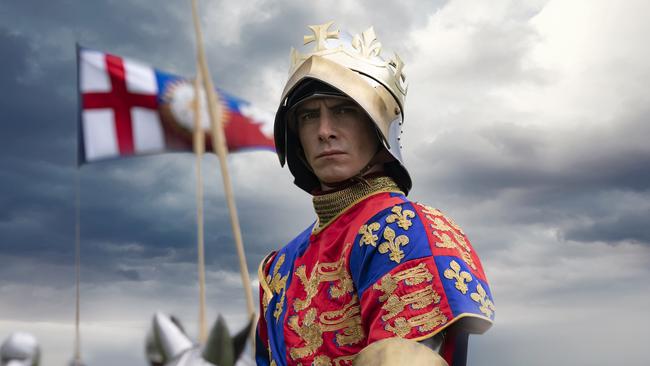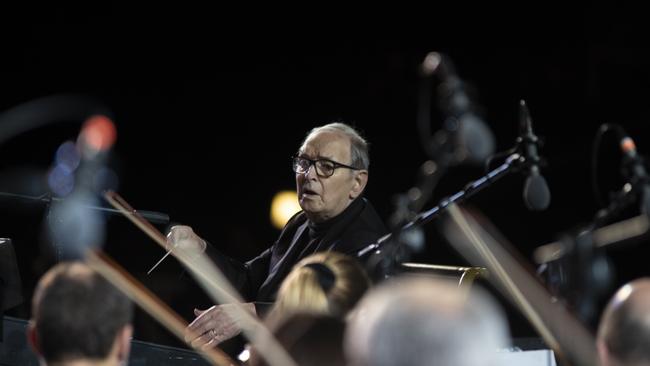The Lost King, riveting yarn from 81-year-old director Stephen Frears
A woman becomes obsessed with restoring the reputation of Richard III and discovering where his body was actually buried.

The Lost King (M)
In cinemas from Boxing Day
★★★★
When I was a teenager I had three main interests: movies, history and crime novels. Back then I acquired, and still have on my bookshelf, a copy of Hugh Ross Williamson’s Historical Whodunits (1955) which contained chapters that probed mysteries such as the strange death of William II in the New Forest, the identity of Perkin Warbeck, the Gunpowder Plot of 1615, and the murders of the Princes in the Tower. The same year that Williamson’s book was published I saw Laurence Olivier’s magnificent film of Shakespeare’s Richard III in which the actor-director gave an unforgettable performance as the black-clad, murderous usurper known as “Crookback”, who was killed at the Battle of Bosworth Field in 1485 at age 32. Among Richard’s crimes, according to Shakespeare, was to order the murders of his nephews, 12-year-old King Edward V and nine-year-old Richard Duke of York, who had been imprisoned in the Tower of London.
Ross Williamson pointed out that the obvious fact that history is written by the winners. Shakespeare’s Richard III was written in 1593, over 100 years after Richard’s death, and the Bard wrote his magnificent plays in the era of the Tudor monarchs, who had succeeded the Plantagenets when the first Tudor king, Henry VII, defeated Richard III, thus ending the Wars of the Roses. According to Ross Williamson, Shakespeare used as his source material a history probably written by Sir Thomas More (of A Man for All Seasons fame) – a history that reflected the Tudor view of past historical events. Fake news? Probably.
Which brings us to The Lost King, a splendid new film from veteran director Stephen Frears. The central character is Philippa Langley (the sublime Sally Hawkins), an Edinburgh wife and mother who became obsessed with restoring the reputation of Richard III and was also determined to discover where the King’s body was actually buried; it was widely believed that after his death his corpse was thrown into the River Soar in Leicester, the city closest to Bosworth.
Philippa is a none too successful officer worker who, early in the film, is passed over for promotion by her boss (who clearly prefers a blonder, younger woman). Separated from, but still on good terms with, her husband, John (Steve Coogan), Philippa juggles the lives of herself and her two sons, Max (Adam Robb) and Raife (Benjamin Scanlan) and her obsession begins when she takes Max to see a production of Shakespeare’s play and is entranced by the handsome actor (Harry Lloyd) who plays Richard III – so entranced that he keeps appearing to her over the following weeks, and though they can talk to one another only she can see him. This is a concept that could have proved irritating but in the screenplay by Coogan and Jeff Pope (who previously scripted Philomena, 2013, for Frears) and thanks to the actors involved, plus the astute direction, it works surprisingly well.
Philippa becomes convinced that, rather than being thrown into the river by his enemies, the King’s body was claimed by his supporters and was buried somewhere in Leicester, probably in a churchyard. She joins the Edinburgh branch of the Richard III society – a worldwide society of Richard fanatics and supporters – and doggedly pursues her goal.
There’s a wonderful scene in which a 15th-century map of the city is superimposed over a modern map, showing where the long-forgotten Greyfriars Church, the King’s probable resting place, was originally located.
Eventually Philippa raises enough money, via contributions from the local university and the city council, plus crowd funding, to excavate the carpark of the Social Services Club where she’s convinced that the body of the King will be found. During this process she has both support and opposition from academics from Leicester University and from bureaucrats in the Leicester City Council, who can see the tourist opportunities of discovering Richard’s body but who want to take all the credit for it.
The 81-year-old Frears, who has enjoyed an illustrious career, once again achieves excellent work, the performances are impeccable, and this story of a lost King proves to be a riveting yarn.
Ennio the Maestro (M)
In cinemas
★★★★
A few years ago I was asked to conduct a Q&A session with the great Italian composer, Ennio Morricone, as part of the Adelaide Festival. I found Morricone exacting and demanding, but we had a great conversation about his work.
In Ennio the Maestro, one of the movie directors he worked with, Giuseppe Tornatore – for whom Morricone composed a fine score for Cinema Paradiso – has made a meticulous, detailed, lengthy (over 2 ½ hours) tribute to the master, much of which consists of a lengthy interview filmed at Morricone’s home where, in a relaxed mood, he talks extensively about his upbringing, his introduction to music, his classical training and his career as a composer of film music.
Morricone (1928-2020) commenced his brilliant career at the start of the 1960s, though his early scores aren’t particularly memorable. However he had a success with the score for Lina Wertmuller’s first film, The Basilisks (1963), and the following year worked on Bernardo Bertolucci’s second feature, Before the Revolution (1964).
He became world famous for his scores for the trilogy of westerns Sergio Leone made with Clint Eastwood – A Fistful of Dollars (1964), For a Few Dollars More (1965) and The Good, The Bad and the Ugly (1966) – but he also scored a significant number of other “spaghetti” westerns during this period, as well as working with important directors such as Pier Paolo Pasolini and Elio Petri.
Personally I’m not such a fan of the bombastic Dollars scores, but I am a huge admirer of Morricone scores for Marco Bellocchio’s Fists in the Pocket (1965), Gillo Pontecorvo’s The Battle of Algiers (1966), Petri’s Investigation of a Citizen Above Suspicion and Dario Argento’s Four Flies on Grey Velvet (1971). I think his finest scores are for Bertolucci’s Novecento/1900 (1976), Terrence Malick’s Days of Heaven (1978) and Roland Joffe’s The Mission (1986).
Tornatore’s film includes interviews with Quentin Tarantino – for whom Morricone composed the score for The Hateful Eight (2015) and won an Oscar for it – Clint Eastwood, David Puttnam (producer of The Mission) and other famous film music composers including John Williams, Hans Zimmer and Quincy Jones.
For anyone interested in film music, this fine documentary is a must-see.

Eternal Spring (M)
Limited cinema release from Thursday
★★★½
Part documentary, part animated feature, this quite powerful film, written and directed by Jason Loftus, is an insider’s account of the persecution of the spiritual group Falun Gong by the Chinese authorities.
The story is told by Daxiong, an animator who became a member of FG (which, apparently, can “cultivate your heart and improve your character”.) A resident of the city of Changchun – which means Eternal Spring – Daxiong was opposed to the March 5, 2002 hijacking by FG members of the local TV station, a “crime” designed to set the record straight about the religion. He feared, correctly, that the authorities, who had already banned the religion, would react violently, as indeed they did.
He fled his home, winding up in Toronto, but staying in touch with other exiled FG members in Seoul and New York.
The film consists of interviews with Daxiong and other FG veterans, alongside an animated depiction of what happened before and after the hijacking. Like other dramatic and political animated films of recent years, including Flee, the film is visually impressive, though completely uncritical of some of the more questionable attitudes of Falun Gong. Daxiong is inspired by the 12th Century Chinese hero, General Yui Fei, whose exploits he admired in comic books in his youth: “What makes a hero is his determination and kindness,” he asserts.




To join the conversation, please log in. Don't have an account? Register
Join the conversation, you are commenting as Logout